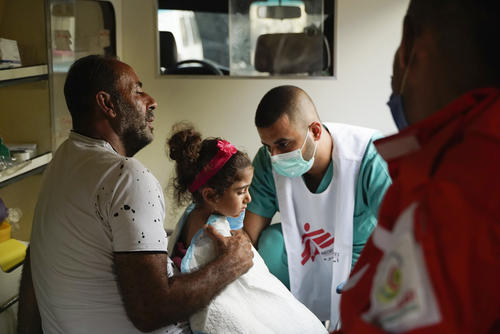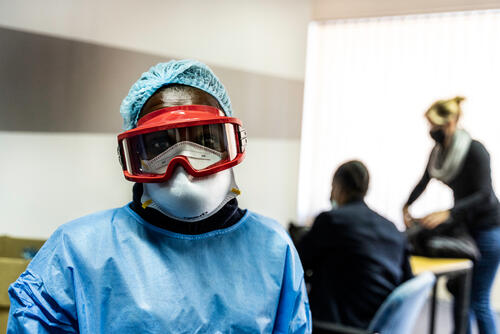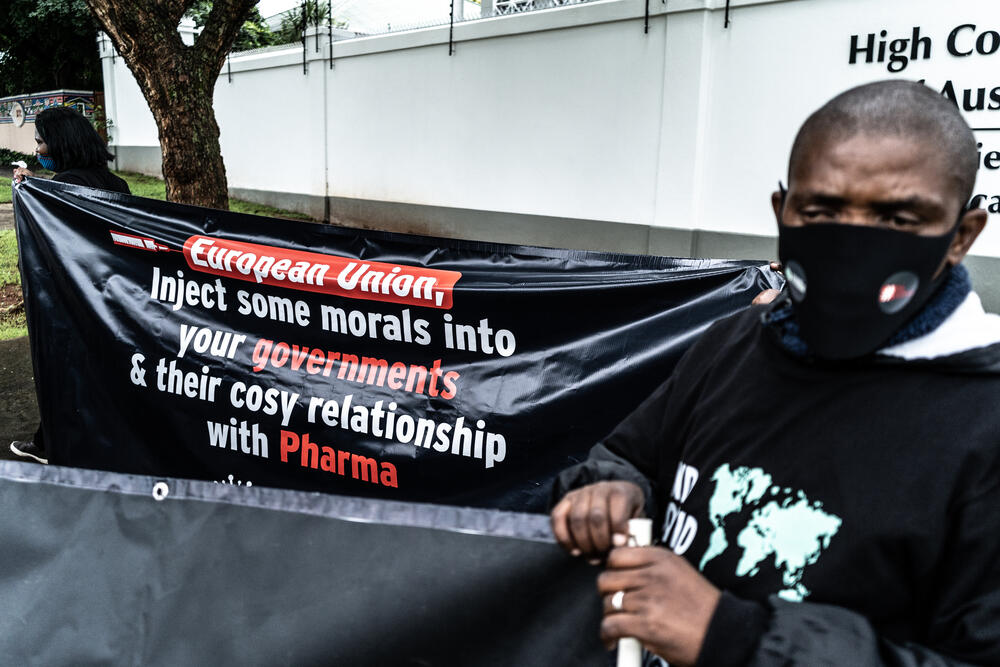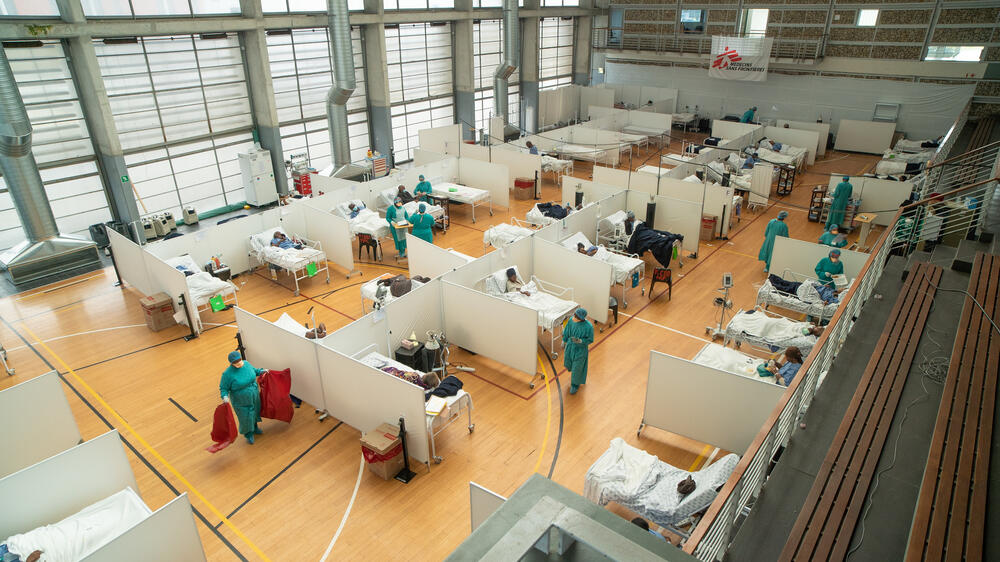COVID-19: Equal access to vaccines critical to protect Southern Africa and the world
Equal access and distribution of vaccines is more critical now than ever, as COVID-19 continues to sweep across Southern and sub-Saharan Africa.
Aggravated by a highly infectious variant of the virus in already fragile healthcare systems, this rapid spread risks generating future pandemics of vaccine-resistant strains.
With the latest initial data indicating that some COVID-19 vaccines may be less effective than others against the 501Y.V2 variant – also known as the South Africa variant – MSF is calling on wealthy states and pharmaceutical corporations to urgently ensure that all countries can access effective vaccines quickly and affordably before it is too late.
The race against new variants
“Truly equitable vaccine allocation and distribution should mean that countries are able to acquire not just any vaccines but the right vaccines," says Dr Tom Ellman, director of MSF’s Southern Africa medical unit.
"[These should be] adapted to the presence of new variants and to contextual factors – at the right time and at the right price.”
“Unless the leaders of wealthy states and pharmaceutical corporations support this, and quickly, we risk generating new pandemics of vaccine-resistant COVID-19. Travel bans will not stop this, but equity and solidarity might,” said Ellman.
“The emergence of new COVID-19 variants should be a major consideration in determining the allocation of vaccines to countries around the world.
“We have already seen South Africa forced to halt and adapt its planned vaccine rollout of one particular vaccine due to findings indicating decreased efficacy against the dominant 501Y.V2 variant.”

Get closer to the Frontline
Get the latest news, stories and updates, straight to your inbox.
Wealthy countries blocking access
Access to vaccines for low-income and middle-income countries will remain a serious problem unless systemic issues linked to protectionist agreements between wealthy nations and pharma corporations are dealt with.
To date, more than 174 million people globally have been vaccinated, however, almost none of these have been in Africa.
Many developed countries have ordered two to three times as many vaccines as is required for their population, and some are even set to receive vaccines from COVAX – a global COVID-19 vaccine sharing programme which many developing nations exclusively rely on.
“What we are witnessing right now is an unacceptable failure of humanity and the global response”
Aggravating the situation, these same countries (that have already vaccinated many of their healthcare workers) have, for months, blocked efforts led by South Africa and India to waive intellectual property protections on COVID-19 medical products and vaccines via the World Trade Organization (WTO).
This move could enable low-income and middle-income countries to produce or access these products more affordably through technology transfers, increased local manufacturing and price competition in the medium term.
“What we are witnessing right now is an unacceptable failure of humanity and the global response,” says Claire Waterhouse, MSF’s regional advocacy coordinator.
“We denounce countries that hoard vaccines and who have started to immunise low-risk groups since it comes at the expense of developing countries who haven’t even started vaccinating frontline healthcare workers in health facilities already stretched to the breaking point.”
Future surges
“MSF staff have witnessed the severe impact of the ‘second wave’ on Southern Africa, its people and its health systems, which struggled to cope with the sudden onslaught of patients,” says Philip Aruna, MSF’s regional operations manager in Southern Africa.
“In South Africa, there weren’t enough healthcare workers in many of the hotspots and hospitals struggled to meet the demands for care."
The pandemic isn't over until it’s over for everyone
Tell the government to stop blocking access to supplies

“While the wave of new infections is starting to slow in some of these countries, we are now preparing for the possibility of future surges of COVID-19 infections as the virus continues to adapt and spread," says Aruna.
“A quick rollout of the most-effective-in-context vaccines would have a significant impact on reducing future infections and deaths among healthcare workers and most at-risk-groups.
“However, most countries in Southern Africa, and indeed the developing world, have yet to receive the quantities of vaccines they need.”
All countries will pay the price
Leaders of states and pharmaceutical corporations must act urgently. Until everyone has access to the right vaccines for their reality, all countries will pay the price.
- MSF urges governments of wealthy nations that have immunised their frontline healthcare workers and high-risk groups to now help low-income and middle-income countries by sharing their supplies with COVAX.
- MSF also urges pharmaceutical corporations to pause or stop bilateral agreements that would over-supply wealthy nations hoarding vaccines in order to prioritise the supply of vaccines to the COVAX facility, or bilateral deals for countries yet to vaccinate their healthcare workers and high-risk groups.
- MSF calls on COVAX leaders, GAVI – the vaccine alliance, the Coalition for Epidemic Preparedness Innovations, the World Health Organization and donor states to take immediate steps for speedy transparency on COVAX supply schedules – so that low-income and middle-income countries know the price, quantities and delivery date of vaccines they will receive.
Every delay is a risk
“While the COVAX mechanism is designed specifically for equitable distribution and vaccine development, it has yet to deliver a single vaccine to a country,” says Waterhouse.
“COVAX lacks crucial transparency toward participating countries. It is clear that the global vaccine access system is inherently flawed, and we urge GAVI and donors to COVAX to acknowledge this and take steps to address this
“Every day COVID-19 vaccines are delayed is another day that healthcare workers in southern Africa and developing countries remain at great risk while they continue to care for the sick.”
MSF and access to medicines
One-third of the world does not have access to essential medicines.
In the poorest parts of Africa and Asia, this figure rises to half the population. We challenge the high cost of medicines and the absence of treatment for many of the diseases affecting our patients.
As a medical humanitarian organisation, it is fundamentally unacceptable that access to essential medicines is increasingly difficult, particularly for the most common global infectious diseases.

